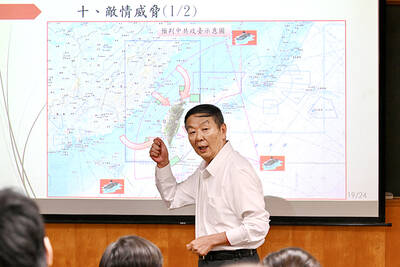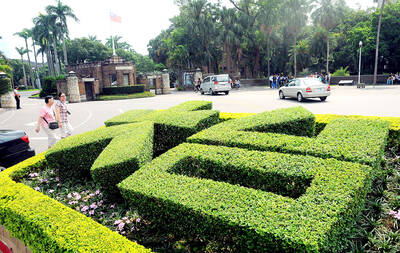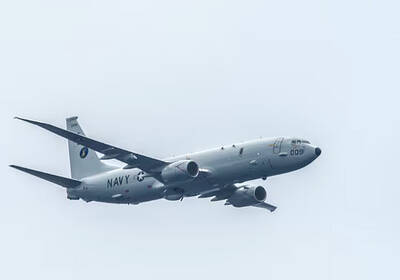China yesterday announced detailed controls on the distribution of news by foreign news agencies, banning all content that violates its own tight media restrictions.
The new measures, which took effect as soon as they were issued by the official Xinhua news agency, limit foreign news agencies to distributing news only through Xinhua or entities authorized by Xinhua.
The detailed rules ban the distribution in China of news content that disrupts "China's economic and social order or undermines China's social stability," Xinhua said.
The limits also ban news that threatens the country's "national unity, sovereignty and territorial integrity," it said.
The announcement said the rules would also apply to release of news and information in China, Hong Kong, Macau and Taiwan, and replace a 1996 Cabinet decree regulating distribution of financial information.
China has long sought to control independent distribution of news and information by foreign companies inside the country while exercising harsh limits on domestic media that are often arbitrarily enforced by vague rules mandating harsh penalties for violations.
Some foreign news groups have managed to set up arrangements allowing for limited distribution of financial data and other information -- deals that the new rules appear to rule out.
The text of the rules issued by Xinhua made no specific mention of foreign distribution of Internet, photo or video news content, although such activities are restricted under other rules.
The new rules appeared designed to end any uncertainties over the government's determination to prevent foreign news businesses from operating in China.
"Foreign news agencies shall not directly solicit subscription of their news and information services in China," it said.
Xinhua said the rules were meant to "promote the dissemination of news and information in a sound and orderly manner."
Other news banned by the rules included: information that might "endanger China's national security, reputation and interests," that might "violate China's religious policies or preach `evil cults' or superstition," and that might "incite hatred and discrimination among ethnic groups" or undermine their unity, it said.
Also forbidden is "other content banned by Chinese laws and administrative regulations," it said.
"Xinhua news agency has the right to select the news and information released by foreign news agencies in China and shall delete any materials mentioned in the items above," it said.
Xinhua will conduct annual reviews to decide whether to renew business licenses of foreign media. Violations can elicit warnings or a grace period to correct mistakes.
Business licenses of foreign news agencies can be suspended or revoked if they break the rules such as publishing objectionable news or directly developing clients.
The rules also impose "disciplinary penalties" on staff members who violate such restrictions, it said.
also see story:
In China, it's Wikipedia versus the Internet censors

RETHINK? The defense ministry and Navy Command Headquarters could take over the indigenous submarine project and change its production timeline, a source said Admiral Huang Shu-kuang’s (黃曙光) resignation as head of the Indigenous Submarine Program and as a member of the National Security Council could affect the production of submarines, a source said yesterday. Huang in a statement last night said he had decided to resign due to national security concerns while expressing the hope that it would put a stop to political wrangling that only undermines the advancement of the nation’s defense capabilities. Taiwan People’s Party Legislator Vivian Huang (黃珊珊) yesterday said that the admiral, her older brother, felt it was time for him to step down and that he had completed what he

Taiwan has experienced its most significant improvement in the QS World University Rankings by Subject, data provided on Sunday by international higher education analyst Quacquarelli Symonds (QS) showed. Compared with last year’s edition of the rankings, which measure academic excellence and influence, Taiwanese universities made great improvements in the H Index metric, which evaluates research productivity and its impact, with a notable 30 percent increase overall, QS said. Taiwanese universities also made notable progress in the Citations per Paper metric, which measures the impact of research, achieving a 13 percent increase. Taiwanese universities gained 10 percent in Academic Reputation, but declined 18 percent

CHINA REACTS: The patrol and reconnaissance plane ‘transited the Taiwan Strait in international airspace,’ the 7th Fleet said, while Taipei said it saw nothing unusual The US 7th Fleet yesterday said that a US Navy P-8A Poseidon flew through the Taiwan Strait, a day after US and Chinese defense heads held their first talks since November 2022 in an effort to reduce regional tensions. The patrol and reconnaissance plane “transited the Taiwan Strait in international airspace,” the 7th Fleet said in a news release. “By operating within the Taiwan Strait in accordance with international law, the United States upholds the navigational rights and freedoms of all nations.” In a separate statement, the Ministry of National Defense said that it monitored nearby waters and airspace as the aircraft

UNDER DISCUSSION: The combatant command would integrate fast attack boat and anti-ship missile groups to defend waters closest to the coastline, a source said The military could establish a new combatant command as early as 2026, which would be tasked with defending Taiwan’s territorial waters 24 nautical miles (44.4km) from the nation’s coastline, a source familiar with the matter said yesterday. The new command, which would fall under the Naval Command Headquarters, would be led by a vice admiral and integrate existing fast attack boat and anti-ship missile groups, along with the Naval Maritime Surveillance and Reconnaissance Command, said the source, who asked to remain anonymous. It could be launched by 2026, but details are being discussed and no final timetable has been announced, the source